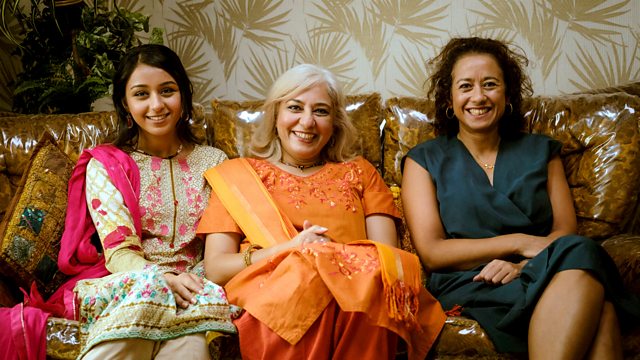Episode 2
The Sharmas' time-travels enter the 1970s. Opening a shop, they join an explosion of South Asian entrepreneurship in Birmingham - from building businesses to creating new beats.
The Sharmas continue their journey through British Asian history, guided by Â鶹Éç Asian Network’s Noreen Khan and historian Yasmin Khan. By the 1970s, many South Asian families had realised that running your own business was the best way to get ahead in Britain – so the Sharmas are now the proud owners of a shop. Catering to the local South Asian community, which makes up more than ten per cent of Birmingham’s population, Sharma Stores is crammed with large sacks of rice, beans, lentils, atta flour, metal buckets, incense, deities and huge tins of ghee – and has more in common with the markets of Mumbai than the local British shops.
The Sharmas quickly discover that a shopkeeper’s life involves long hours and plenty of manual labour to keep the shop stocked, priced and competitive. Mum Manisha and daughter Alisha are tasked with cooking authentic delicacies to entice South Asian customers hankering for a taste of home. First up is the notoriously fiddly gulab jamun, an Indian sweet, followed swiftly by savoury samosas. Meanwhile, Dad Vishal and son Akash take it in turns to man the till and restock the shelves, weighing and dividing the large sacks of dried goods into more customer-friendly portions.
The 1971 war of independence in Bangladesh and Idi Amin’s expulsion of Indians from Uganda in 1972 forced thousands of South Asians to flee their homes, with many taking up their right as Commonwealth citizens to settle in the UK. Akash follows in the footsteps of many young male Bangladeshis who arrived in the early 70s, taking on a job as an onion cutter in a local restaurant. He's under the watchful eye of Michelin-starred chef Akhtar Islam, whose own father came from Bangladesh. These new arrivals helped radically transform the culinary landscape in Birmingham, opening some of the city’s first curry houses and adapting flavours from home to suit the western palate - spawning a multimillion-pound industry. Manisha’s father was born in Uganda and moved to Britain shortly before Idi Amin came to power. Alisha cooks a traditional Ugandan Asian dish, and the family gather with historian Yasmin Khan to reflect on his journey and the thousands who came after bringing little more with them than the clothes on their backs.
As their businesses began to prosper, South Asian families were able to invest, so the Sharmas take delivery of their first car – a glorious brown Austin Allegro, made at the firm’s Longbridge plant in Birmingham. Manisha and Vishal head off for a spin, taking in the city’s latest tourist attraction, the newly opened Spaghetti Junction, before arriving at Birmingham’s first South Asian cash-and-carry: East End Foods. As they load up the car, they discover how the company’s founders, the Wouhra brothers, had spotted a gap in the market - supplying ingredients like atta flour, chickpeas, spices and chillies in family-sized packaging to sell on to new South Asian shopkeepers like themselves.
Noreen Khan joins the family for a rare evening enjoying an innovative new sound that’s sweeping the Midlands: bhangra. The music fuses western pop, Hindi film soundtracks and folk music from the Punjabi region, and was first created in Birmingham. The Sharmas are joined by friends and family to dance the night away with a band fronted by bhangra legend Balbir Singh.
Change comes at a dizzying pace over the next few years. Alisha takes on her first job outside the home and learns the story of the Imperial Typewriters strike, where a group of South Asian women took on their bosses to demand equal pay and opportunities to their white counterparts. Along with Manisha, she also meets Samira Ahmed to hear about the iconic Pebble Mill Studios and its production of programmes celebrating South Asian culture. Against a backdrop of rising unemployment, inflation and the cost of living, by 1976 South Asians were increasingly becoming the target of far-right groups such as the National Front. Attacks on people and property were on the rise, culminating in violence on the streets in the hot summer of '76. The Sharmas experience just a small fraction of what was becoming a daily occurrence for British Asian communities in the UK.
1977 sees an excuse for a party. While the Queen commemorated her silver jubilee, British nationals with Indian, Pakistani and Bangladeshi heritage were also marking the anniversary of Partition. The family takes a rare day off from working in the shop and heads to the park for a celebratory picnic.
As the decade draws to a close, Noreen and Yasmin Khan join the family for a party. The family reflect on the decade, concluding that although much has moved on in terms of representation and acceptance, it has been a decade marked by struggle. They look forward to better times - and better clothes! - in the 80s and 90s.
Last on
More episodes
Previous
Next
Clips
-
![]()
A family night out with bhangra legend Balbir Singh
Duration: 00:56
-
![]()
Hot wheels
Duration: 00:58
Music Played
-
![]()
Kalyanji-Anandji
Title Music (Johny Mera Naam)
-
![]()
Asha Bhosle
Husn Ke Lakhon Rang
-
![]()
Kalyanji-Anandji
Music (Johny Mera Naam)
-
![]()
Elton John
In The Summertime
-
![]()
Asha Bhosle, Kishore Kumar
O Mere Raja
-
![]()
Asha Bhosle
Dum Maro Dum
-
![]()
Asha Bhosle
Piya Tu Ab To Aaja
-
![]()
The Hollies
Long Cool Woman (In A Black Dress) (2003 Digital Remaster)
-
![]()
Ravi Shankar
Anxiety
-
![]()
Black Sabbath
Paranoid
-
![]()
Black Sabbath
Paranoid
-
![]()
Steve Harley & Cockney Rebel
Make Me Smile (Come Up and See Me)
-
![]()
Rahul Dev Burman
Mehbooba Mehbooba
-
![]()
Rahul Dev Burman
Title Music (Sholay)
-
![]()
Kishore Kumar
Koi Haseena
-
![]()
Lata Mangeshkar, Kishore Kumar
Holi Ke Din
-
![]()
Kishore Kumar, Amitabh Bachchan
My Name Is Anthony Gonsalves
-
![]()
The Specials
Gangsters
-
![]()
Kanchan
Laila O Laila
-
![]()
Nazia Hassan & Feroz Khan
Aap Jaisa Koi
-
![]()
Kavita Krishnamurthy, Shreya Ghosal
Dola Re Dola
Credits
| Role | Contributor |
|---|---|
| Presenter | Noreen Khan |
| Expert | Yasmin Khan |
| Musician | Balbir Singh |
| Producer | Sara Ahmad |
| Series Producer | Naveed Chowdhary Flatt |
| Executive Producer | Emily Shields |
| Director | Victoria Bell |
| Editor | Christopher White |
| Editor | Jamie Crookston |
| Production Company | Wall to Wall West |
Broadcasts
- Tue 21 Jun 2022 20:00
- Sat 25 Jun 2022 16:00
- Sat 16 Jul 2022 01:35
- Wed 8 Mar 2023 19:00




